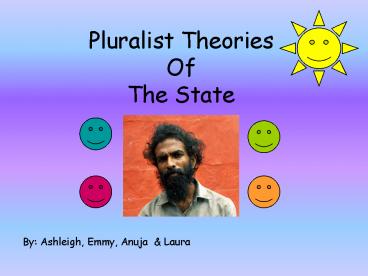Pluralist Theories Of The State - PowerPoint PPT Presentation
Title:
Pluralist Theories Of The State
Description:
Argues Modern democratic societies are characterized by power being dispersed between elite ... of what is best for society is a ... to Pluralist theory , ... – PowerPoint PPT presentation
Number of Views:108
Avg rating:3.0/5.0
Title: Pluralist Theories Of The State
1
Pluralist TheoriesOfThe State
- By Ashleigh, Emmy, Anuja Laura
2
Pluralist View On State
- Pluralist see the State as an organisation which
represents the interests of members of society as
a whole. - They argue that direct political involvement to
the population is impractical. - Pluralists see the State as a neutral arena where
competing interests and pressure groups lobby for
influence. - The state isnt dominated by one group- there are
multiple or plural centres of power. - The State arbitrates between competing interest
groups and is neutral. - Argues Modern democratic societies are
characterized by power being dispersed between
elite groups, represented by pressure groups and
political parties.
3
R.A Dahl
- 1961
- Looked at the role of interest groups and found
several groups influenced the State. - State is neutral, never dominated by one group.
- Contrast to Marxist view.
4
Dunleavy and OLeary
Pluralists Dunleavy and OLeary indentified the
three main pluralist views of the state. They
were The Weathervane model The states
direction reflects public opinion and the demands
of pressure groups. This means that state policy
is based on the concerns and interests of
society. The neutral state model The state is
seen as the neutral or impartial arbiter who acts
in the publics interests. This arbiter
compromises between the demands of different
pressure groups and makes sure that even the
weakest groups are heard. These demands are then
assessed in terms of what is best for society is
a whole. It is different from the Weathervane
model because it is more active in that it
listens to a range of different views then makes
decisions in the publics interest. The broker
state model This view sees groups within the
state as having their own interests and concerns.
Although state officials may negotiate with a
number of interests groups and can develop
compromises with conflicting demands, most
policies tend to reflect the concerns of the
state officials themselves.
5
The Function Of The State The function of the
state, according to Pluralist theory , is to act
as neutral, independent referee or honest
broker whose role is to reconcile and
accommodate competing interests. Aron sees the
State as in the business of compromise. Resources
such as power and capital are in the hands of the
State and its role is to distribute this power to
deserving causes.
6
- Criticisms
- The pluralist theory is criticised for being too
optimistic about the State and the government. - The State cannot act as an honest broker as it is
impossible to govern without using power and
without favouring certain power and political
groups.
7
Evaluation
We believe that the theory is coherent because
Dunleavy and OLeary have a lot of truth in what
they are saying about the broker model. It is
correct that the State tend to put across their
own concerns and dont just focus on the concerns
of individuals and members of pressure groups.
R.A Dahl is correct in his theory because
many groups do influence the State, its not just
down to one group.































